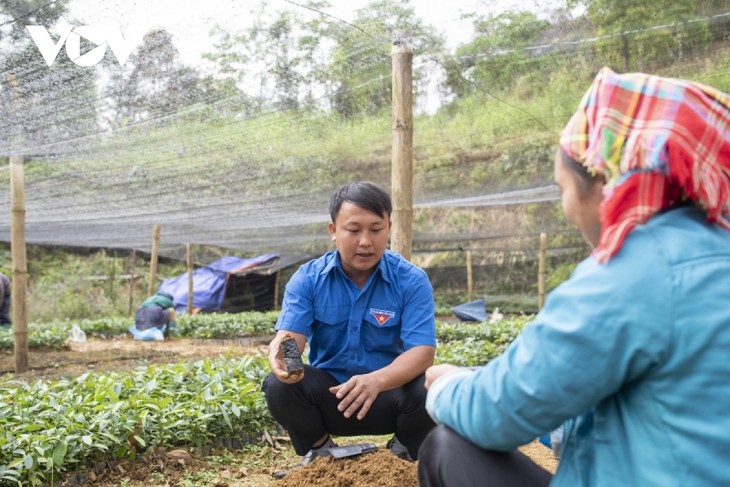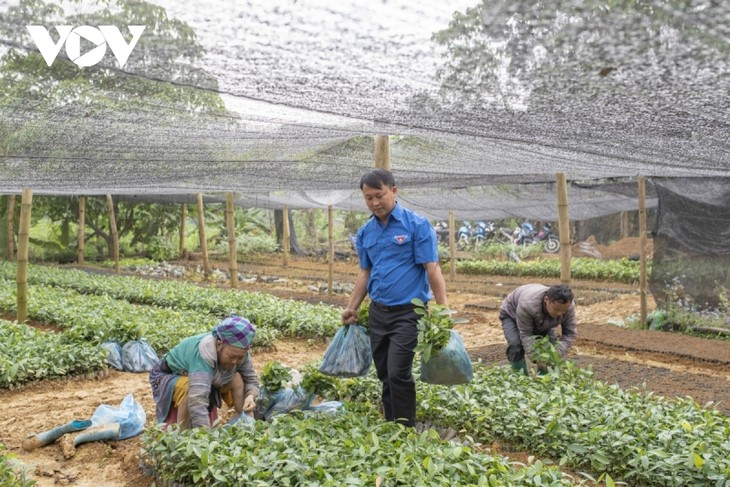(VOVWORLD) - Giving up a good job in the city, Hoang Seo Chan of the Mong ethnic minority returned to his homeland in the northern mountainous province of Lao Cai and started a business. He also nurtured a dream to cover the hills with trees.
 Hoang Seo Chan shows a cooperative member how to pack the saplings. (Photo: VOV) Hoang Seo Chan shows a cooperative member how to pack the saplings. (Photo: VOV) |
In his cinnamon nursery, Hoang Seo Chan is busy making phone calls, receiving customer orders, and directing his employees to pack seedlings for delivery.
Chan says he learned a lot about discipline, division of labor, and production management by working for three years as an industrial welder for car and aircraft manufacturers in Japan. After gaining experience in machinery and a foreign language as a guest worker in Japan, Chan went to work in Hanoi.
“At first I worked in Hanoi, but, knowing that my homeland was underdeveloped and that people there still lived in poverty, I decided to return to my homeland and work there. With my knowledge and work experience, I hoped to help the locals find good jobs and improve their living conditions,” said Chan.
Chan was born in Ban Me commune in Lao Cai province, where many Nung, Mong, and Thu Lao ethnic minority people subsist on maize farming and small-scale animal husbandry. Life was difficult there. Chan did a lot of research and tried different agricultural development models in his locality. It was on a trip to the central province of Quang Nam that Chan found what looked like the best way.
“On a visit to Tam Ky district, I saw the locals growing acacia and Bodhi trees in a mountainous area covered with forests. The local people there are well-off. My homeland is also hilly, so I thought of applying their model,” said Chan.
In 2017, Chan spent all of his savings on bringing this model to Lao Cai. He said, “When I returned to my homeland, I first began growing vegetables intercropped with rice on the same land. Realizing they could earn a good income from vegetables, local farmers started following my model.”
Since then Chan has tried many initiatives to afforest his area. He researched local weather patterns and obtained suitable trees from the Vietnam National University of Agriculture in Hanoi.
“I experienced multiple failures at first. I kept trying different seedlings until I found the ones best suited to the local weather pattern. Practice turned out to be more important than theory,” said Chan.
At the age of 38, Chan is the head of Ban Me cooperative, which has 2 nursery gardens that supply more than 200,000 seedlings to the market each year. His cooperative has 30 members, each earning an income of around 430 USD per month.
“Our cooperative grows seedlings and saplings. My income depends on the number of products I can make. Chan’s cooperative now can produce a large number of seedlings,” said Leng Thi Khoi, a member of the Ban Me cooperative.
 The Ban Me cooperative has created jobs for many locals. (Photo: VOV) The Ban Me cooperative has created jobs for many locals. (Photo: VOV) |
Chan helped local farmers with cultivation techniques and encouraged them to shift from maize to more profitable cinnamon. Chan also works with the Si Ma Cai district Department of Education and Training to provide vocational training and job consultation to ethnic minority people.
“I hope to cover this area with trees, which will help ensure clean water and a cooler climate. We can benefit a lot from the forest,” he said.
Chan was named to a national list of outstanding young rural persons and received the 2020 Luong Dinh Cua award which is given to young people in rural areas with outstanding achievements in production, business, application of modern science technologies, environmental protection and new rural lifestyle building.